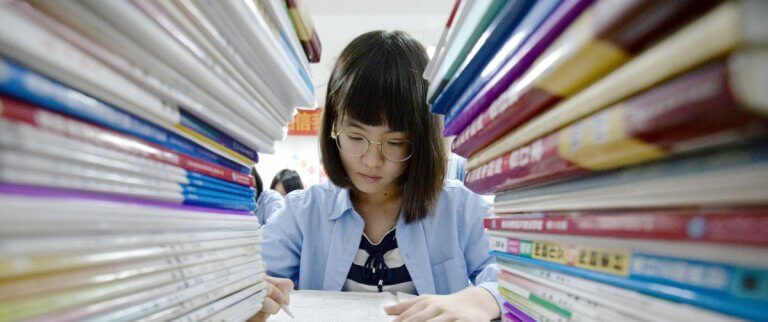
Childhood is not supposed to be a time for stress and anxiety. But one thing is increasingly making it so for young school children worldwide: exams.
Writing in HuffPost, parenting author Sarah Ockwell-Smith details how her 10-year-old son turned from a kid who was hungry to learn about everything in and out of school – baking brownies, riding bikes, philosophy – last year, to one who would today describe his day at school with just one word – “stressful”.
“No enthusiasm, no hunger for learning, no regaling me with tales of the kings and queens and emperors of times past. No talk of different countries, religious festivals or the latest animals he had studied. My baby boy’s world is now full of stress,” wrote the co-founder of the GentleParenting.
“My boy who spoke of nature, wizards, Pugs and cartoon characters now tells me “my life sucks”. Once when we were driving past his school he said ‘There it is, the place that makes my life hell’,” she continued.
‘This is what SATs do to children’ https://t.co/bkQUXw5aE6
— HuffPost UK (@HuffPostUK) April 17, 2019
The upcoming SATs or Standard Assessment Test exams will take place in just over one week’s time. Thousands of other children around the UK will be joining Ockwell-Smith’s stressed son as they sit the KS2 (Year 6) papers in English Reading, Maths and Grammar, Punctuation and Spelling (GaPS or SPaG).
But whatever acronym these exams have, stress is a common feature in children taking standardised exams all over the world. In Singapore, the Primary School Leaving Examinations (PSLE) come with high stakes – one pupil was reportedly scolded by her mother for being careless with the questions and only scoring 83 marks. She was later referred for counselling because of her anxiety, depression and self-harm.
“Her mother told her that she could have scored above 85 had she been more careful,” Lena Teo, Deputy Director of Therapy and Mental Wellness Services at the Children-At-Risk Empowerment Association Singapore, told the Straits Times.
In South Korea, they start young. More than 83 percent of five-year-olds attend after-school education programmes, or hagwon, and many continue to do so throughout their school years. The country’s study culture has pupils reportedly spending up to 16 hours a day preparing for exams.
Once these young pupils get into high school, the whole grind starts again. It’s now time to gain entrance into college. In regions like East Asia, famed for its consistent performance in the Trends in International Mathematics and Science Survey and the Programme for International Student Assessment (PISA), comes with a major drawback: it is notorious for the extreme competition to get into its elite universities.

Candidates sketching during a mass art school application examination at an exhibition centre in Jinan, in China’s eastern Shandong province. Source: AFP/STR
Like the celebrity kids whose parents defrauded their way into elite US colleges, the motivation to get into these elite institutions is the same – it can make or break one’s future.
And so, fueled by this undue and extreme pressure, many students resort to drastic measures.
Candidates for China’s standardised college entrance test, the gaokao, have reportedly used IV drips to aid concentration, or contraceptive pills to delay their periods until after the test. Meanwhile, in Japan, a 2014 study by Japanese neuropsychiatrists found about 58 percent of students retaking its standardised college entrance exam – known as the “Centre Test” – suffered from depression, thanks to their feelings of a loss of identity, failure and anxiety over sitting for it again.
Ockwell-Smith wrote: “This is what SATs do to children. They don’t gain anything from them, but they lose so very much.”
It is heartening to note that some countries are paying more attention to a more holistic form of academic development. The International Baccalaureate, which aims to develop all-round, highly-educated global citizens, has grown to be offered by over 4,700 schools, both state and independent, worldwide.
Singapore last year announced it was scrapping the mid-year examinations for Primary 3 and 5 and Secondary 1 and 3 students over the next three years. The reason is to help students discover the joy of learning and move away from the disproportionate focus on grades. Rankings in class and level will no longer be stated in reports. Decimal points in marks are getting the boot too, as marks will be rounded off and presented as whole numbers.
Liked this? Then you’ll love…
What to do if you’re always unprepared for exams
The revision diet: The best foods to keep you focused for exams







